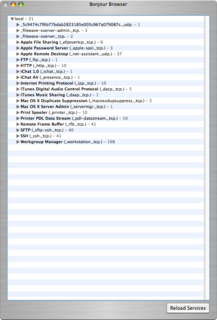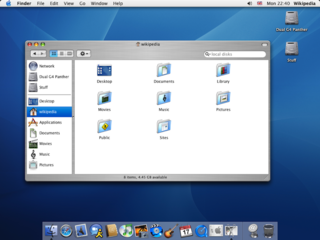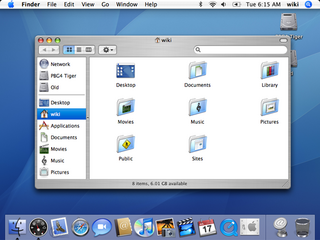
macOS is a proprietary graphical operating system developed and marketed by Apple Inc. since 2001. It is the primary operating system for Apple's Mac computers. Within the market of desktop, laptop and home computers, and by web usage, it is the second most widely used desktop OS, after Windows NT.

QuickTime is an extensible multimedia framework developed by Apple Inc., capable of handling various formats of digital video, picture, sound, panoramic images, and interactivity. First made in 1991, the latest Mac version, QuickTime X, is available for Mac OS X Snow Leopard up to macOS Mojave. Apple ceased support for the Windows version of QuickTime in 2016, and ceased support for QuickTime 7 on macOS in 2018.
Darwin is an open-source Unix-like operating system first released by Apple Inc. in 2000. It is composed of code derived from NeXTSTEP, BSD, Mach, and other free software projects code, as well as code developed by Apple.
Cocoa is Apple's native object-oriented application programming interface (API) for its desktop operating system macOS.

The Finder is the default file manager and graphical user interface shell used on all Macintosh operating systems. Described in its "About" window as "The Macintosh Desktop Experience", it is responsible for the launching of other applications, and for the overall user management of files, disks, and network volumes. It was introduced with the first Macintosh computer, and also exists as part of GS/OS on the Apple IIGS. It was rewritten completely with the release of Mac OS X in 2001.
The history of macOS, Apple's current Mac operating system formerly named Mac OS X until 2012 and then OS X until 2016, began with the company's project to replace its "classic" Mac OS. That system, up to and including its final release Mac OS 9, was a direct descendant of the operating system Apple had used in its Macintosh computers since their introduction in 1984. However, the current macOS is a Unix operating system built on technology that had been developed at NeXT from the 1980s until Apple purchased the company in early 1997.

Bonjour is Apple's implementation of zero-configuration networking (zeroconf), a group of technologies that includes service discovery, address assignment, and hostname resolution. Bonjour locates devices such as printers, other computers, and the services that those devices offer on a local network using multicast Domain Name System (mDNS) service records.

wxWidgets is a widget toolkit and tools library for creating graphical user interfaces (GUIs) for cross-platform applications. wxWidgets enables a program's GUI code to compile and run on several computer platforms with minimal or no code changes. A wide choice of compilers and other tools to use with wxWidgets facilitates development of sophisticated applications. wxWidgets supports a comprehensive range of popular operating systems and graphical libraries, both proprietary and free, and is widely deployed in prominent organizations.

Mac OS X Panther is the fourth major release of macOS, Apple's desktop and server operating system. It followed Mac OS X 10.2 and preceded Mac OS X Tiger. It was released on October 24, 2003.

Mac OS X Tiger is the fifth major release of macOS, Apple's desktop and server operating system for Mac computers. Tiger was released to the public on April 29, 2005 for US$129.95 as the successor to Mac OS X 10.3 Panther. Some of the new features included a fast searching system called Spotlight, a new version of the Safari web browser, Dashboard, a new 'Unified' theme, and improved support for 64-bit addressing on Power Mac G5s. Mac OS X 10.4 Tiger offered a number of features, such as fast file searching and improved graphics processing, that Microsoft had spent several years struggling to add to Windows with acceptable performance.

The Mac OS X Public Beta was the first publicly available version of Apple Computer's Mac OS X operating system to feature the Aqua user interface. It was released to the public on September 13, 2000 for US$29.95. Its release was significant as the first publicly available evidence of Apple's ability to ship the long-awaited "next-generation Mac operating system" after the Copland failure. It allowed software developers and early adopters to test a preview of the upcoming operating system and develop software for the forthcoming operating system before its final release. It is the only public version of Mac OS X to have a code name not based on a big cat until the release of 10.9 Mavericks in 2013. The US version had a build number of 1H39 and the international version had build number 2E14.
A phidget is a physical representation or implementation of a GUI widget. For example, an on-screen dial widget could be implemented physically as a knob.
Aaron Hillegass Is the founder and former CEO of Big Nerd Ranch. Aaron is best known to many programmers as the author of Objective-C: The Big Nerd Ranch Guide, Cocoa Programming for Mac OS X, and iOS Programming: The Big Nerd Ranch Guide.

IconBuilder is a popular plugin for Adobe Photoshop, Adobe Photoshop Elements and Macromedia Fireworks for the editing and creation of computer icons created and used by The Iconfactory. It supports all icon sizes for both Mac OS X and Microsoft Windows. IconBuilder was created when there was no official tool from Apple Computer for making icons in the .icns format introduced by Mac OS 8.5.

Mac OS X Snow Leopard is the seventh major release of macOS, Apple's desktop and server operating system for Macintosh computers.

OnyX is a popular freeware utility for macOS developed by French developer Joël Barrière that is compatible with both Intel processors and Apple silicon. As a multifunctional tool for maintenance and optimization, it can control many basic Unix programs already built into macOS, including setting hidden preferences otherwise modified by using property list editors and the command line.

Peter Hart Gregory, CISA, CISSP is an American information security advisor, computer security specialist, and writer. He is the author of several books on computer security and information technology.
Scott Knaster is an American technical writer who has written many books, mostly dealing with Macintosh programming and using the Macintosh. He has worked for such companies as Apple Inc., General Magic, Microsoft, Danger Inc., and Google.
Ircle was an IRC client developed by Onno Tijdgat for the Macintosh computer platform. Ircle was shareware, with free upgrades. The client was scriptable with AppleScript, supported multiple channels and servers, and up to ten simultaneous connections. It was discontinued in 2009. Since 2012, Ircle was not compatible with most recent versions of OS X, and no updates were available. In December 2017 the Ircle home page displayed a poll, to end Q2 2018, to determine whether a new version should be released on OS X and iOS. The results of the poll were 311 votes in favor of a new Mac OS version, 43 votes for an iOS version, and 117 votes for both a Mac OS and iOS version, out of 528 votes cast.

The Xojo programming environment and programming language is developed and commercially marketed by Xojo, Inc. of Austin, Texas for software development targeting macOS, Microsoft Windows, Linux, iOS, the Web and Raspberry Pi. Xojo uses a proprietary object-oriented language.










